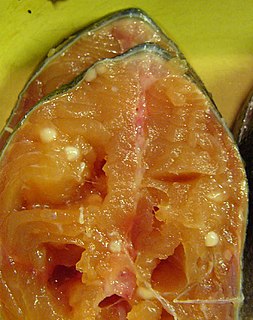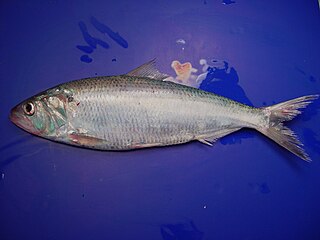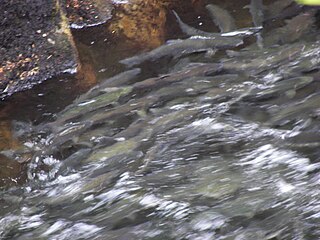
The United States Fish and Wildlife Service is an agency of the United States Federal Government within the United States Department of the Interior dedicated to the management of fish, wildlife, and natural habitats. The mission of the agency is "working with others to conserve, protect, and enhance fish, wildlife, plants and their habitats for the continuing benefit of the American people."

Fishery can mean either the enterprise of raising or harvesting fish and other aquatic life; or more commonly, the site where such enterprise takes place. Commercial fisheries include wild fisheries and fish farms, both in freshwater bodies and the oceans. About 500 million people worldwide are economically dependent on fisheries. 171 million tonnes of fish were produced in 2016, but overfishing is an increasing problem — causing declines in some populations.
The goal of Fisheries management is to produce sustainable biological, social, and economic benefits from renewable aquatic resources. Fisheries are classified as renewable because the organisms of interest usually produce an annual biological surplus that with judicious management can be harvested without reducing future productivity. Fisheries management employs activities that protect fishery resources so sustainable exploitation is possible, drawing on fisheries science and possibly including the precautionary principle. Modern fisheries management is often referred to as a governmental system of appropriate management rules based on defined objectives and a mix of management means to implement the rules, which are put in place by a system of monitoring control and surveillance. A popular approach is the ecosystem approach to fisheries management. According to the Food and Agriculture Organization of the United Nations (FAO), there are "no clear and generally accepted definitions of fisheries management". However, the working definition used by the FAO and much cited elsewhere is:
The integrated process of information gathering, analysis, planning, consultation, decision-making, allocation of resources and formulation and implementation, with enforcement as necessary, of regulations or rules which govern fisheries activities in order to ensure the continued productivity of the resources and the accomplishment of other fisheries objectives.

Gillnetting is a fishing method that uses gillnets: vertical panels of netting that hang from a line with regularly spaced floaters that hold the line on the surface of the water. The floats are sometimes called "corks" and the line with corks is generally referred to as a "cork line." The line along the bottom of the panels is generally weighted. Traditionally this line has been weighted with lead and may be referred to as "lead line." A gillnet is normally set in a straight line. Gillnets can be characterized by mesh size, as well as colour and type of filament from which they are made. Fish may be caught by gillnets in three ways:
- Wedged – held by the mesh around the body.
- Gilled – held by mesh slipping behind the opercula.
- Tangled – held by teeth, spines, maxillaries, or other protrusions without the body penetrating the mesh.

Oncorhynchus is a genus of fish in the family Salmonidae; it contains the Pacific salmon and Pacific trout. The name of the genus is derived from the Greek ὄγκος + ῥύγχος, in reference to the hooked jaws of males in the mating season.
Steven C. Hackett is an American economist, and Professor of Economics at Humboldt State University (HSU), known for his contributions to the fields of environmental and natural resources economics.

Henneguya zschokkei or Henneguya salminicola is a species of a myxosporean parasite of certain species of salmon of genus Oncorhynchus. It causes milky flesh or tapioca disease.

The environmental impact of fishing includes issues such as the availability of fish, overfishing, fisheries, and fisheries management; as well as the impact of industrial fishing on other elements of the environment, such as bycatch. These issues are part of marine conservation, and are addressed in fisheries science programs. According to a 2019 FAO report, global production of fish, crustaceans, molluscs and other aquatic animals has continued to grow and reached 172.6 million tonnes in 2017, with an increase of 4.1 percent compared with 2016. There is a growing gap between the supply of fish and demand, due in part to world population growth.

The hickory shad is a member of the herring family Clupeidae, ranging along the East Coast of the United States from Florida to the Gulf of Maine. It is an anadromous fish species, meaning that it spawns in freshwater portions of rivers, but spends most of its life at sea. It is subject to fishing, both historic and current, but it is often confused with or simply grouped together with catch statistics for American shad.
The Alaska Department of Fish and Game (ADF&G) is a department within the government of Alaska. ADF&G's mission is to protect, maintain, and improve the fish, game, and aquatic plant resources of the state, and manage their use and development in the best interest of the economy and the well-being of the people of the state, consistent with the sustained yield principle. ADF&G manages approximately 750 active fisheries, 26 game management units, and 32 special areas. From resource policy to public education, the department considers public involvement essential to its mission and goals. The department is committed to working with tribes in Alaska and with a diverse group of State and Federal agencies. The department works cooperatively with various universities and nongovernmental organizations in formal and informal partnership arrangements, and assists local research or baseline environmental monitoring through citizen science programs.
John Davidson Letcher was an American academic and an acting president of Oregon State University. He served as the acting president for 4 months in 1892, upon the death of the second president Benjamin Lee Arnold.
Carl Walters is an American-born Canadian biologist known for his work involving fisheries stock assessments, the adaptive management concept, and ecosystem modeling. Walters has been a professor of Zoology and Fisheries at the University of British Columbia since 1969. He is one of the main developers of the ecological modelling software Ecopath. His most recent work focuses on how to adjust human behaviors in environments that are full of uncertainty. He is a recent recipient of the Volvo Environment Prize (2006). In 2019, Dr. Walters became a Member of the Order of British Columbia.

The survival of wild salmon relies heavily on them having suitable habitat for spawning and rearing of their young. This habitat is the main concern for conservationists. Salmon habitat can be degraded by many different factors including land development, timber harvest, or resource extraction. These threats bring about the traditional methods of protecting the salmon, but a new movement aims to protect the habitats before they require intervention.

Ray Hilborn is a marine biologist and fisheries scientist, known for his work on conservation and natural resource management in the context of fisheries. He is currently professor of aquatic and fishery science at the University of Washington. He focuses on conservation, natural resource management, fisheries stock assessment and risk analysis, and advises several international fisheries commissions and agencies.
Michael Paul Nelson is an environmental scholar, writer, teacher, speaker, and consultant who holds the Ruth H. Spaniol Chair in Renewable Resources and is a Professor of environmental philosophy and ethics at Oregon State University. He also serves as the Lead Principal Investigator for the H.J. Andrews Long-Term Ecological Research Program at Oregon State. Nelson is also the philosopher in residence of the Isle Royale Wolf-Moose Project, and the co-founder and co-director of the Conservation Ethics Group.

William J. Ripple is a professor of ecology at Oregon State University in the Department of Forest Ecosystems and Society. He is best known for his research on terrestrial trophic cascades, particularly the role of the gray wolf in North America as an apex predator and a keystone species that shapes food webs and landscape structures via “top-down” pressures.
The Humboldt cutthroat trout is a subspecies of cutthroat trout, a North American fish in the family Salmonidae. It is one of the several subspecies of cutthroat trout. It was formally scientifically named in 2008 by Trotter and Behnke, who stated its distribution is in the basins of the upper Humboldt River of northern Nevada, the Upper Quinn River, as well as the Whitehorse (Coyote) basin (Oregon). The Nevada and Oregon Fish and Wildlife authorities still consider these populations belonging to the subspecies O. c. henshawi.
Carl B. Schreck is an American biologist specializing in comparative endocrinology of fishes, best known for his contributions to our knowledge of stress in fish. Since 1975 he has been a professor at Oregon State University, holding the position of senior scientist and leader of the Oregon Cooperative Fish and Wildlife Research Unit.

Steven J. Cooke is a Canadian biologist specializing in ecology and conservation physiology of fish. He is best known for his integrative work on fish physiology, behaviour, ecology, and human-dimensions to understand and solve complex environmental problems. He currently is a Canada Research Professor in Environmental Science and Biology at Carleton University and the Editor-in-Chief of the scientific journal Conservation Physiology.

Dr. Robert J. Behnke was an American fisheries biologist and conservationist who was recognized as a world authority on the classification of salmonid fishes. He was popularly known as "Dr. Trout" or "The Trout Doctor". His seminal work, Trout and Salmon of North America, was published in 2002. He wrote a regular column for Trout Magazine, the quarterly publication of Trout Unlimited. He was a fisheries biologist with the U.S. Fish and Wildlife Service in the Colorado Cooperative Fish and Wildlife Research Unit and a professor at Colorado State University in the 1970s. He became a Professor Emeritus at the Department of Fishery and Wildlife Biology at Colorado State University.












